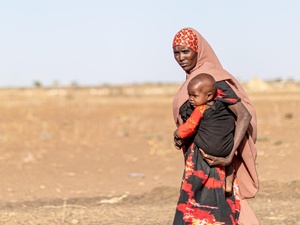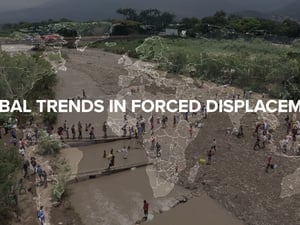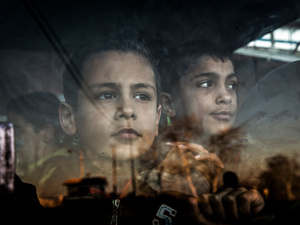UNHCR still concerned about security situation in camps near Goma
UNHCR still concerned about security situation in camps near Goma

Women wait for food to be distributed at the Mugunga III camp.© UNHCR/S.Kpandji
GOMA, Democratic Republic of the Congo, December 18 (UNHCR) – The UN refugee agency on Tuesday said the security situation at the Mugunga III camp for internally displaced people (IDP) in the eastern Democratic Republic of the Congo continues to be a serious concern. Soldiers and unidentified armed men continue to be present in and around the camp in North Kivu province, fuelling worries among the thousands of IDPs living there.
"The presence of armed men at Mugunga III and other IDP sites around [the North Kivu provincial capital of] Goma is a threat to the civilian character of the camps, something we have repeatedly urged all sides to respect. In addition, it exposes IDPs to risks of violence in violation of their fundamental rights, including the right to physical safety and integrity," said Adrian Edwards, a UNHCR spokesman.
He said UNHCR repeated its appeal for such sites throughout eastern Democratic Republic of the Congo (DRC) to be kept strictly off limits for all armed groups and actors. Civilians must be kept out of harm's way and any deployment of armed men in densely populated areas should be avoided.
UNHCR also urged all unauthorized members of the military or armed groups present in camps and sites to leave immediately.
In the most recent incident known to UNHCR on December 14, four armed men entered Mugunga III – apparently looking for aid items, including plastic sheeting, food and water. Two people were injured by gunfire.
On the night of December 9-10, gunmen looted several homes around Mugunga III and demanded goods or money. Three people were also shot and wounded on this occasion. These incidents are in addition to those recorded during the night of December 1-2, when armed men looted parts of Mugunga III and raped several women.
The wider security situation around Goma itself remains difficult, with government troops, fighters from the rebel M23 movement and other armed groups still present close to the city. The tension is being stoked by uncertainty over the progress of current peace talks in Kampala, Uganda, between the DRC government and the M23, which captured Goma in late November before withdrawing after 10 days.
"All parties in the current conflict should take all the necessary precautions to protect civilians against the effects of armed hostilities," stressed Stefano Severe, UNHCR's regional representative.
Separately, unrelated fighting in north-eastern Democratic Republic of the Congo has caused about 4,000 people to flee across the border into South Sudan. The refugees crossed from Agorobo village in DRC's Province Orientale over the past five days. They say they fled because of military operations seeking to contain unidentified armed rebels groups active in their home area.
Most of the new arrivals are women with small infants and separated or unaccompanied children. UNHCR's priority is to identify these unaccompanied children as quickly as possible to ensure those most at risk, particularly adolescent boys, are protected.
"While we have provided new arrivals with aid, we are also working with the South Sudanese authorities to move people to a more secure area away from the border within the next three to four days," said UNHCR's Edwards.
Safe site locations are still being discussed and assessed, as concerns have been raised about the presence of landmines in the vicinity. UNHCR will support the transportation of individuals as soon as a site is identified. There are already more than 18,400 refugees from the Democratic Republic of the Congo in South Sudan.












